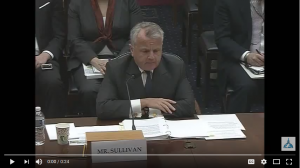5 key points from yesterday’s hearing on counterterrorism in Africa
Across Africa, radical Islamist terrorists are waging a brutal war. In recent years, we’ve seen deadly attacks in places like Somalia, Kenya, and Nigeria. Thousands have died – including Americans. As part of the Foreign Affairs Committee’s regular oversight of this fight, the committee yesterday held a public hearing with Deputy Secretary of State John Sullivan and Acting Under Secretary of Defense for Policy David Trachtenberg to examine U.S. efforts to help African governments eliminate terrorist threats.
Here are 5 key takeaways:
Terrorist groups in Africa are a threat to U.S. national security interests
Mr. Sullivan: “Since 2009, terrorist groups in the region have killed more than 20,000 people and abducted thousands of women and girls, causing at least two million people to flee their homes.”
We cannot allow terrorists to establish safe havens in Africa
Mr. Sullivan: “What we don’t want is a place where – as there was in Sudan in the 1990s or Afghanistan in the late 90s/early 2000s – places where terrorist organizations can plant root, flourish, plan attacks against the United States. That’s what we want to eliminate.”
We cannot defeat the terrorists with military action alone
Mr. Sullivan: “The situation we find ourselves in today, particularly on the African continent, the problems we see are not going to be solved by military action alone. In fact, I think Secretary Mattis has testified and made clear, as has Secretary Tillerson, that a focus on good governance, human rights, training for partner militaries are extremely important.”
The State and Defense departments are working together to fight underlying causes of extremism
Mr. Trachtenberg: “The problems of terrorism that we are talking about on the African continent deal with, at their very heart, some of the issues… of weak governance in some of these countries, poverty, exploiting local grievances. Our work within DOD, in working with our partner nations, is to help provide those partner countries with the capacity, themselves, to be able to defend themselves against extremist organizations and terrorist capacities. But that is, of course, not the end of the story. And so, that is why we work very closely with our State Department colleagues to make sure that once security is provided, effective tools can be put in place to improve governance and deal with some of the underlying issues that give rise to some of these violent extremist organizations in the first place.”
State’s partnerships with NGOs are one key to preventing radicalization
Mr. Sullivan: “NGOs are not just helpful but essential. We partner with them everywhere, particularly for humanitarian assistance; PEPFAR relies on partnering with NGOS. [They’re] really key for us.”




